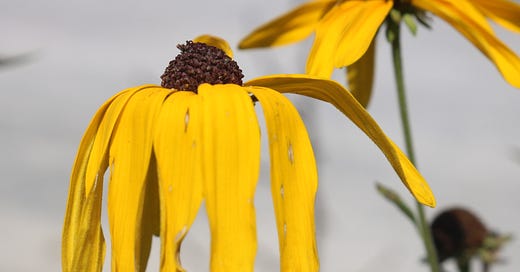Coneflower at Audubon Acres. Photo by Ray Zimmerman
My previous article included a brief biography of Robert Sparks Walker and s synopsis of his literary significance. This issue is a commentary on his four books of poetry. All were nature focused, but the first one had a strong religious message. The others were more philosophical.
1925 Walker, Robert Sparks. Anchor Poems, New York, Fleming H. Revel Company.
I was fortunate to obtain a copy of this volume from a used book dealer. The publication came at a time of transition in Walker’s business, family, and career as a writer. In 1921, he sold his interest in the magazine Southern Fruit Grower, but the purchaser died before making payment. The estate settled the debt for a small portion of the amount due. His wife Elberta died the same year he published this book, leaving him as a single parent of their son Wendell. He opened the book with this dedication: To Wendell, my son because he frequently disagrees with me.
He followed the dedication with a quotation from an old hymn:
Hope is the anchor of the soul, Sure, and steadfast it holds. And while the billows fret and roll, The bloom of peace prevails.
Using the anchor as a Christian symbol in the book's title is intentional. Each poem is religious or philosophical, with a brief quotation from scripture at its beginning. The patriotic poem "The Grave of the Unknown Soldier" ends with the assurance that "God remembers well his name." "Silver" warns against the obsession with wealth, while "The Burning Candle" assures readers that sins can be forgiven.
The poem "Who is my Neighbor" calls to mind the story of the good Samaritan. The narrator is the wounded man who received aid and comfort from a stranger. He refers to "…the man I met on the road to Jericho" and ends with the line, "He loves me as he does himself."
These topics are unsurprising for an author who served as President of the Men's Association at Pilgrim Congregational Church.
Walker the naturalist is also present in these poems. The poem "The Blizzard's Masterpiece" celebrates God's hand even in the destructive forces of nature and begins with a quotation from Job 38:22, "Has thou entered into the treasuries of snow?” Another poem, "Leaf Mold," describes the recycling of elements in the natural world.
1927 Walker, Robert Sparks, My Father's Farm, Boston, The Four Seasons Company.
Walker devoted a chapter in his final published book, As the Indians Left It, to My Father’s Farm. He stated his surprise that My Father's Farm was listed as a noncirculating book at the Boston Public Library. He learned this on a visit there in 1924. The book was so popular that the library could only meet demand by restricting it to noncirculating use.
By extolling rural life, Walker found his audience, and his audience loved his work. His final poem, "The Farm Incarnate," sees him as not a resident but a part of its very essence. He also stated in the introduction that he discovered he was an incarnation of the farm on a visit there.
I am the incarnation here Of father's farm I loved so dear.
This is a different spirituality than that expressed in Anchor Poems. "The Coming of the Snows" presents a world transformed. Other poems speak of cowbells and mockingbirds, with a clover-covered hillside as the focus of one piece. The final stanza of "Driftwood" changes a poem about a mundane subject into a commentary on the human condition.
On the reeking streams of life, Human driftwood is the strife, Matters, not our stations. High the places we have graced, Where the current leaves us placed, There with circumstances braced Settles our vocations!
Walker never tired of presenting aspects of the natural world. The book contains poems about muscadine grapes, yellow water lilies, a sweetgum tree, and the valuable hickory tree. The poem "Hans Nipper" is a humorous ode about a frugal farmer who refuses to buy new clothes. Walker reprinted that poem and "The Old Ash Hopper,” in As the Indians Left It.
My Fathers Farm is available for viewing online from Concord Theological Seminary as an ebook.
1938 Walker, Robert Sparks, When God Failed, Dallas, Kaleidograph Press.
This collection of poems begins with a visit to his wife Elberta's grave on Mother's Day. It ends with an expectation of reunion with her and their deceased son Robert Jr., in the afterlife. It is an outpouring of grief and resolution.
1950 Robert Sparks Walker, State Flowers, and State Birds: Being an Authentic Record of the Official Birds and Flowers of all the States of America, Litchfield, Illinois, Sunshine Press.
The original volume does not include Alaska and Hawaii since they had not achieved statehood. Birds adopted by multiple states had a poem for each state. He produced a revised edition in 1960, which includes Alaska and Hawaii. According to the publisher, the revised edition is Walker's final published work. He died a month before it was released.
For more on this Robert Sparks Walker, see my article in the Chattanooga Pulse.




